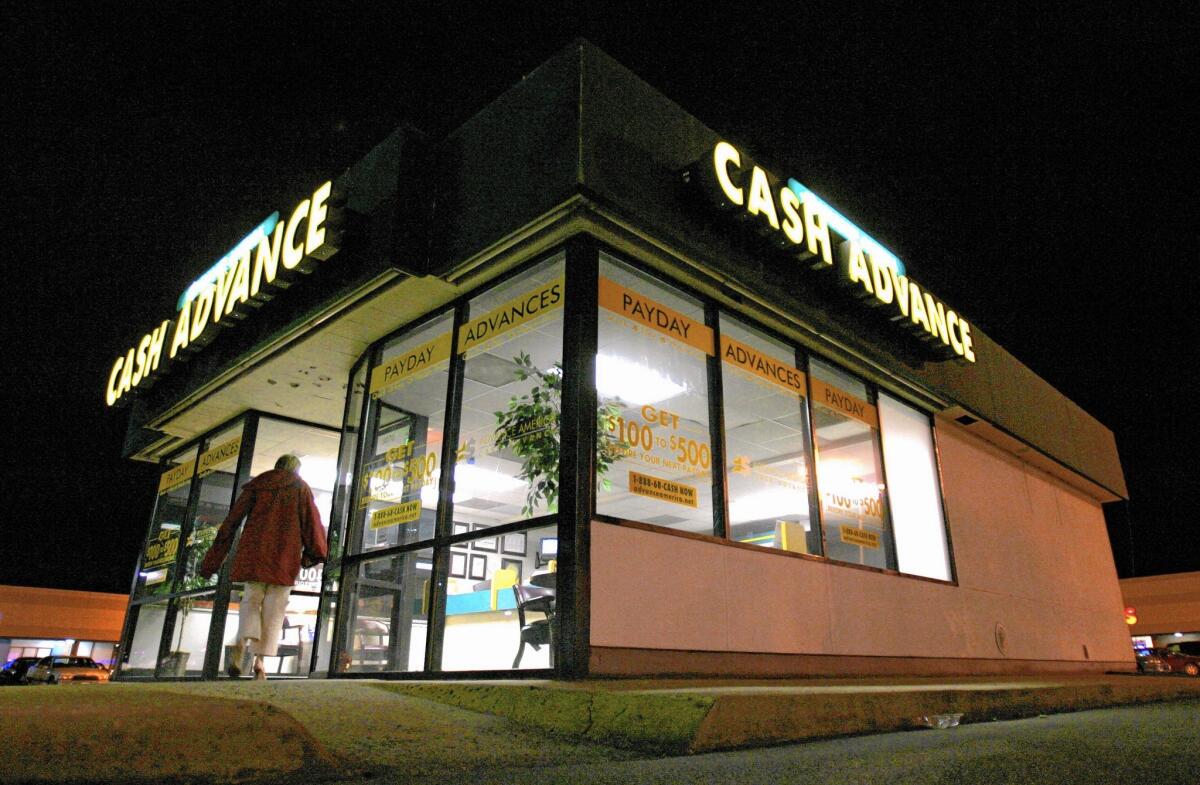Column: When collectors call, demand proof of your debt

- Share via
Suzanne Husted went through a rough patch about a decade ago and had to take out a pair of $300 payday loans to get by. She said she paid each back within a couple of months.
Now she’s getting calls from two different debt collectors insisting that $2,400 in principal and interest is owed and that she better come across with some scratch or she’ll be dragged into court.
“When I ask when I took out the loans, they say it was in 2010 and 2011, which I know didn’t happen,” Husted, 53, told me. “When I ask for statements confirming the loans, they say I can only see them after they file lawsuits against me.”
See more of our top stories on Facebook >>
Husted said she’s started sending money to the collectors “out of fear” but wants to know if there’s a better way to handle this situation.
There is — and it begins with knowing your rights.
“Consumers have very strong rights,” said Alec Trueblood, a Los Angeles lawyer who specializes in fighting debt collectors. “There’s the federal Fair Debt Collection Practices Act and, for Californians, there’s the state Fair Debt Collection Practices Act. Together, they provide a lot of protection.”
He added: “A lot of consumers probably don’t know that they can end harassment by debt collectors just by mailing a letter.”
Consumer debt is growing again, and that’s emboldening debt-collection firms that purchase obligations for pennies on the dollar and aggressively try to squeeze cash from borrowers.
The Federal Reserve Bank of New York reported this month that, as of the third quarter, consumers were holding $12 trillion worth of IOUs. Consumer debt peaked six years ago at $12.68 trillion but dropped during the recession as people tightened their belts and as millions of home loans fell into foreclosure.
The borrowing picked up again in 2013 — and so have unpaid bills.
A report to be released Tuesday by the Alliance for a Just Society, an advocacy group, estimates that 77 million Americans have delinquent debt, with the average amount owed topping $5,000.
A composite of consumer loan delinquencies compiled by the American Bankers Assn. found that more obligations went unpaid in the third quarter than in the previous three months. Credit card delinquencies also were slightly higher.
“Disciplined financial management by consumers is an essential ingredient for lower delinquencies,” said James Chessen, the association’s chief economist.
Husted’s troubles illustrate multiple ways that debt collectors try to take advantage of people.
“In this case,” said Trueblood, “I would suspect that these aren’t even real debt collectors. There are gangs of criminals that try to scam people out of money.”
The red flag, he said, is the collectors’ unwillingness to provide corroborating information about the loans, claiming instead that the evidence will only be revealed in court.
According to the Federal Trade Commission: “Every collector must send you a written ‘validation notice’ telling you how much money you owe within five days after they first contact you. This notice also must include the name of the creditor to whom you owe the money, and how to proceed if you don’t think you owe the money.”
That’s the law. Period.
Keep written records of your request for the validation notice and the collector’s refusal to provide it. On the off chance that your case ends up in court, this will show the judge that you acted in good faith.
Federal and state law also prohibit collectors from harassing people. From the FTC: “If you send the debt collector a letter stating that you don’t owe any or all of the money, or asking for verification of the debt, that collector must stop contacting you.”
Again, keep records of your correspondence. And remember that debt collectors are not permitted to be abusive in any way, misrepresent the amount you owe or threaten legal action if they have no intention of filing suit.
That last one is important because there are statutes of limitation for most consumer debt. A debt collector still can take you to court but, if the time limit has passed, you can ask the judge to throw out the lawsuit.
For that reason, few debt collectors would attempt a lawsuit for old debt. They’re gambling instead that consumers don’t know their rights and will pay at least part of the amount owed to make the problem go away.
In California, the statute of limitations for most consumer debt, including credit cards, is four years. For oral contracts, the time limit is two years.
In Virginia, where Husted now lives, the statute of limitations is six years. The clock typically starts ticking from the time you fell behind on payments. Keep in mind that a collector can still put a black mark on your credit file, which will remain there for seven years from the date of your first missed bill.
The website Bankrate.com has a handy chart for checking the statute of limitations in every state.
I passed all this info along to Husted, who said she won’t be sending any more cash to the collectors. And if they keep bugging her, she’ll turn to her posse — her state attorney general, the FTC and the Consumer Financial Protection Bureau.
“I was scared to death before,” Husted said. “Now I’m feeling more confident.”
She should. She’s not alone.
David Lazarus’ column runs Tuesdays and Fridays. He also can be seen daily on KTLA-TV Channel 5 and followed on Twitter @Davidlaz. Send your tips or feedback to [email protected].
MORE FROM DAVID LAZARUS
Why is the food industry dead set against warning labels?
Our privacy is losing out to Internet-connected household devices
Do Congress members get Medicare? Yes -- and a whole lot more
More to Read
Inside the business of entertainment
The Wide Shot brings you news, analysis and insights on everything from streaming wars to production — and what it all means for the future.
You may occasionally receive promotional content from the Los Angeles Times.











